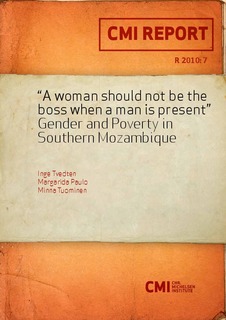| dc.description.abstract | This is the third and final report in the series “Gender Policies and Feminisation of Poverty in Mozambique”, revealing a curious incongruity between often broad and sweeping statements about gender inequality and the great variation and complexity in the lives of real men and women. The province of Gaza, which is the focus of this report, has seen profound socio-economic change, including an extensive male labour migration, a commodification and ‘feminisation’ of agriculture; and a very high HIV/AIDS infection rate. Important implications of these developments have been a very large proportion of female headed households; a high level of female participation in agriculture and the informal economy; and near gender equality in education enrolment. In fact, the main gender disparities in Gaza primarily seem to be related class, with poor women without economic independence being susceptible to continued control under the patrilineal system and patriarchal ideolog | |
